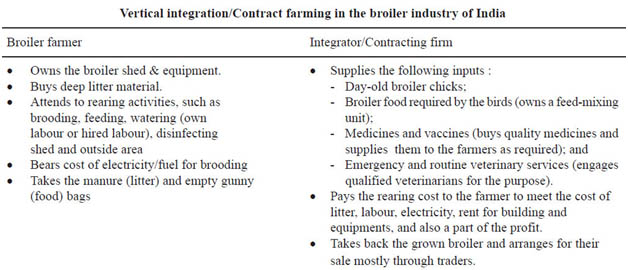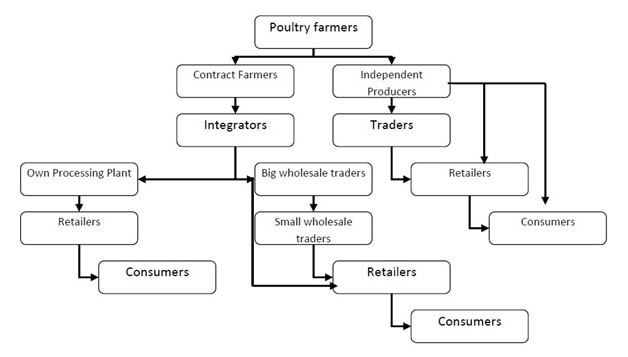 |
|
|
| CONTRACT FARMING IN POULTRY SECTOR |
| Back |
Contract Farming has become an increasingly important aspect of agri-business as well as poultry sector in recent years. Poultry farming could play an effective role in improving the economic status of the rural people by increasing their income besides providing nutritious food through meat and eggs. From the farmer’s point of view, contractual arrangement can provide them with access to production services, credit as well as knowledge of new technology and moreover pricing arrangements can reduce the risk and uncertainty. Contract farming can act as an effective tool in mitigating risks faced by farmers while marketing of broiler produce to final consumer.
Definition
“Contract Farming can be defined as an agreement between farmers and processing or marketing firms for the production and supply of agricultural products under forward agreements, frequently at predetermined prices.”
Contract farming in India
- Contract farming in poultry has been successful in India due to the presence of strong backward linkages.
- The nature of contracting has been instrumental in sharing growers’ risk through buyback guarantee and also provision of coping with production failure.
- Provision of quality inputs such as chicks, feed and medicine helps the poultry farmers raise quality chickens.
- Apparently, balanced contracts that benefit both parties in terms of assured markets, competitive price and guarantee against risk have resulted in the success of poultry contract farming.
- Poultry integrators have been expanding rapidly in the states of Karnataka, Tamil Nadu, Andhra Pradesh and Maharashtra.
- The key players in integration include Venkateshwara, Suguna, Godrej, Shanti, Jaffa, Arumbagh, Skylark, etc.
Input and Service Delivery Agreement in Broiler Production
What actually “Integration” is?
- A contract farming arrangement in broiler production, referred to as ‘chick growing agreement’ is generally a wage contract between an ‘integrator’, who supplies the intermediate inputs and procures the output. The integrator provides the growing stock (dayold chicks), feed, veterinary supplies and services, and implements the final marketing of the output.
- The contract farmer typically provides the space and facilities (land and housing), equipment, utilities, labour (family and/or hired) and day-to-day farm management. Thus, the major component of working capital is borne by the integrator and who is the absolute owner of movable stocks in the farm.
- The farmer receives a guaranteed wage or growing charges for each live bird based on its live weight in a condition that is predetermined and agreed upon through contractual obligation.
- Generally, the payments are linked to the performance criteria in terms of efficiency in managing the birds; for example, the weight, quantum of feed used to produce that weight (FCR), percentage of birds died and others.
- Additional incentives are given to the farmer for surpassing the performance standards. For a farmer who falls below the set standards, corresponding penalty, amount per bird, is subtracted from the wage bill.
- Hence, the production contracts can be seen as a self-regulating system of reward and punishment to ensure cost effective production of broilers for the integrator in accordance with the quality and quantity needed by the markets.
 |
 |
| Flow Chart of Contract Poultry Farming
|
Advantages of contract farming
- The poultry processor chooses those whose skills, experience and access to credit market make them relatively poor prospects as the independent growers.
- The next major advantage of the contract farming is the improved technology and specialized management practices. This results in low feed consumption.
- The poultry farming suggest that contracting is a useful institutional arrangement for supply of credit, insurance and technology for the farmers which are quite beneficial to the producer otherwise all of these are quite demanding problems.
- Assurance against market risks and any price fluctuations.
Advantages of non contract farming
- The major advantage in the non-contract farming is that the producer is able to sell the produce directly to the traders at the current prevailing market price on the current day at the nearest market where as this is not possible in the case of contract farming.
|
| Back |
|
|
Developed by :
|
Dr.Rahulpreet Singh
( M.V.Sc Scholar ) |
Dr. Pranav Kumar
(Assistant Professor)
|
Dr. Amandeep Singh
(M.V.Sc Scholar, IVRI ) |
|
|
|
|
|
|
Scroll
|
| Division of Veterinary and Animal Husbandry Extension Education Faculty of Veterinary Sciences and Animal Husbandry, R.S. Pura, SKUAST Jammu |
|


